The issue of cast based system in Karnataka seen from four different perspectives
Caste-based demarkation and hierarchy are long-standing issues passed on over the ages. As city dwellers, we are hardly aware of how much impact it has on the life of people in remote locations.
There have been innumerable arguments from both sides, defending and attacking one another. Both sides, however, can not be completely right or wrong.
On my all-India cycle tour journey starting from Karnataka, I got asked multiple times what caste I belong to. This stirred up some thoughts in my mind. I want to ask why people still thrive forward with the caste-based system.
I was offered perspectives from an 8th-standard category-based kid, a Bhraman, and a mixed group of people sitting together on the caste-based system of the society.
Some of them have made me think deeply. I realized that nobody is right or wrong. Finally, following age-old traditions without present-day relevance may not be the best way forward. If thoughts about why the caste-based system is necessary aren’t exercised, casteism becomes just a blind belief.
Here are the perspectives I got to listen to about the caste-based system in Karnataka:
Table of Contents
ToggleWhy do I not have the right to stand amongst others?
On day 3 of my all-India cycle tour, I met a kid who happened to take me to a temple for a festival. As I approached a village hungry just before lunch, I asked a kid aged 14 where I could find some food. He told me that a festival was taking place close by and that he could direct me.
As he too was heading to the same place, I took the opportunity to walk with him. In the process, I figured out that he studied in 8th grade in a government Kannada medium school.
The kid seemed extremely enthusiastic and spoke on a wide variety of social topics. I was completely surprised to see an 8th-grade kid be able to speak on such topics concerning society. While kids of his age I get to meet usually speak about sports they play and the movies they watch, Pavan said he enjoyed studying Social sciences.
When we reached the temple premise, I asked Pavan if he wanted to go inside with me. He blindly denied it and stood outside. Belonging to a scheduled caste category, Pavan had been through some hardships in his life. He complained how he wasn’t allowed to stand in queue and people play politics to push him out.
Looking at the spark in his eye, I called him outside and spoke with him further. The kid went to Ambedkar library each day for 2 hours to read biographies and other books. He quoted some of the books and asked me if I had read them. When I asked him what inspired him to read the books, he seemed to be in disbelief wondering why one wouldn’t read them. He said they are means to educate oneself about society.
Sensing the opportunity to contribute, I helped him to understand the basics of English and how he needs to proceed to learn the language. I gave him a plan of action to learn the language and handed him a copy of the paper and the pen I was carrying with me.
The kid thanked me from all his heart, took my number and left saying he will return my favour someday. A couple of moments later what happened made me think deeply. Why would such a bright kid who wants to be educated be sidetracked?
What bad has he done that disallows him to live a life similar to others in society? A little support will help him go a long way forward, and that’s all that is required.
It is an age-old tradition I do not want to break
On day 2 of the journey, I stayed over with an Aradhya Bhramin family. There, I go to meet Gurushanth Aradhya who is also religious and prays to God each day.
While speaking, accidentally the discussion on caste spurred up. Mr. Gurushanth said he refuses to let anyone of the caste beneath, enter their house. Although he is fine with them sitting right outside and being served food there, he detests the idea of letting them into the house.
On being asked why he discriminates against people, Gurushanth sir said he has been following age-old traditions as has been followed by ancestors before him. He wouldn’t change it as a mark of respect and fear. Fear because if something went wrong, he would start wondering if it was because the customs weren’t followed.
That didn’t seem to be a convincing answer, but that was the only reason he had in hand. He wasn’t the only person with the argument. On day 4 of my journey, I stopped by a bus stop to take some rest. There I got the opportunity to speak with a mixed pot of people from different castes.
An old woman sitting on the ground belonging to the lower caste seemed to defend the idea of casteism saying it has existed since the earth and man came to be. She said if somebody above in the hierarchy is beside them, they are supposed to respect them and pointed towards one of them sitting there. The person just listened to it and nodded.
My mind couldn’t help but feel that this is a delusional world!
There could be a wide range of reasons that one caste of people respects the other. Mistreating and looking down upon someone from another caste seems to have no meaning if it is followed because it existed earlier!
Certain activities that the lower caste people are involved in
Speaking with a range of these people during the journey, the thing that I get to hear the most is the dislike of the activities they indulge in. Especially drinking. Eating non-vegetarian food, lack of cleanliness and their style of speaking are the other reasons why they are disliked.
None of the above reasons seems completely convincing.
If some students in the class are troublemakers, you don’t have them thrown out and fail them. Instead, you treat them as equals and let them grow. Allow them to pursue what they are best at.
I wish that we are all United and that the world is a better place to live in
On day 5 of my tour, I stopped by a government school to take a class for the students. I was generously allowed in and given the opportunity to teach the students the subject of my choice.
With this, I also took the opportunity to speak with the vice principal of the school, Mr. Shivanna. Having completed his MSc, M.Ed, and PGDS, he is well-educated and in the right position to speak about casteism and its effect on society.
Mr. Shivanna was open to a discuss on this front. Coming from a scheduled caste background himself, he had complaints surrounding all around him about caste-based segregation.
He addressed some major issues making me think each time he spoke.
A. The new NEP policy
The new NEP policy introduces skill-based training as a part of education to middle and high school kids. Shivanna sir said that education has to be uniform for everyone. The NEP policy makes lower-category people take up skills that they have been best for ages. Such as stitching slippers, pot making, and so on. This allows them early on to earn meagre amounts of money making them bypass education.
For further reading: https://pib.gov.in/PressReleaseIframePage.aspx?PRID=1844721
B. 15 years voluntary retirement
This is a policy introduced by the government which makes voluntary retirement possible post 15 years of service. The same has been misused to unemploy some of the employed candidates claimed Mr. Shivanna. While some of the richer upper-class Bhramins can survive the impact, the lower-class people will be impacted heavily by this move.
C. Privatization in the education sector
Currently, kids are studying at government schools at the rate of rupees 250 a year. This along with free food offered every afternoon is the propelling factor for current generation kids’ education. This is the only reason why lower caste people are getting educated.
With privatization in the education sector, the number of kids from well-off families who go to government schools has reduced drastically. This has led to government school funding being cut off and teachers’ employment being reduced. Some of the government schools which are the only ray of hope for lower caste education are being shut down every year.
If teachers are not employed and handed the salary to teach, there is absolutely no meaning to free education.
Why do I have to pay tax is the question Shivanna sir posed.
In between, while we were having this discussion, a kid from 6th grade walked into the chamber and asked Sir for money. Sir just took out a note from his pocket and handed it to him. I asked him what just happened. Sir explained that these kids belong to such rural backgrounds that they can not even afford medications when required. He said the kid he gave the money to, was feeling sick. He gave some money from his own pocket.
The kid eventually returned purchasing three dolo 650 tablets which I could see in his hand. He handed the change to sir, thanked him and left. I was pleased to witness the kind gesture that Mr. Shivanna showed.
He continued to explain that he is also the district high school HM association president, government SC/ST workers association president, Buddhist society of India vice president, and also runs free tuition for kids from 10th to 12th in the next town named Parivarthana study centre. He requested and insisted I go there and take a look at the centre to understand their efforts in helping these underprivileged kids. Shivanna sir said that he finds it hard to even get a couple of minutes of free time and that he is busy 24/7.
On asking how he finds the energy to do so much, Sir explained how he was brought up in a rural setting and how he wanted to give back to the community.
According to B R Ambedkar’s teachings, one is supposed to give 10% of their talent, time, and treasure back to society. He said he was trying to do as much or even more. He said his vision was to see a happy society where everyone is looked at as the same. Where casteism doesn’t rule the education sector at least.
Shivanna sir said that most upper-caste people tend to fit themselves into a comfort box. Once they get comfortable, they do not come out of it. Mostly these people do not contribute to the society and are heavily self minded. He claimed that Bhramins mostly belong to this class. They don’t go beyond their family and build houses for themselves where they rest without thoughts about the society. He said he didn’t want to be them.
It was my pleasure to meet Mr. Shivanna. Before I bid farewell, we exchanged numbers and made good friends with each other.
I am a 31 year young PhD graduate who has decided to travel the length and breadth of India on my cycle, to document the journey of meeting a vast array of people. In my journey, I intend to understand the characteristic features of the people of this nation and categorize them based on their demographics, age, profession, gender, traditions, and cultural differences.
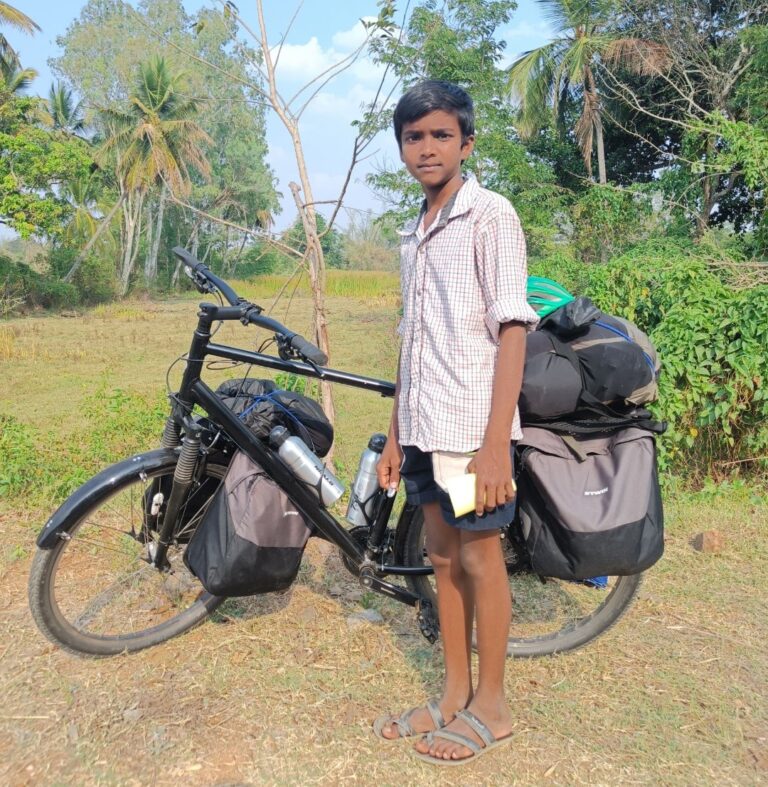
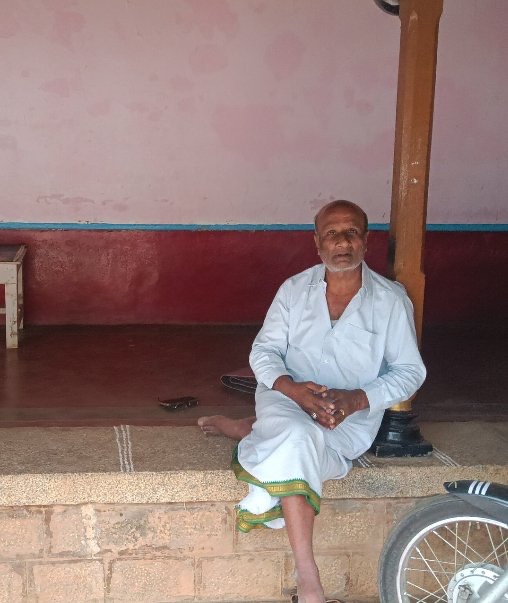
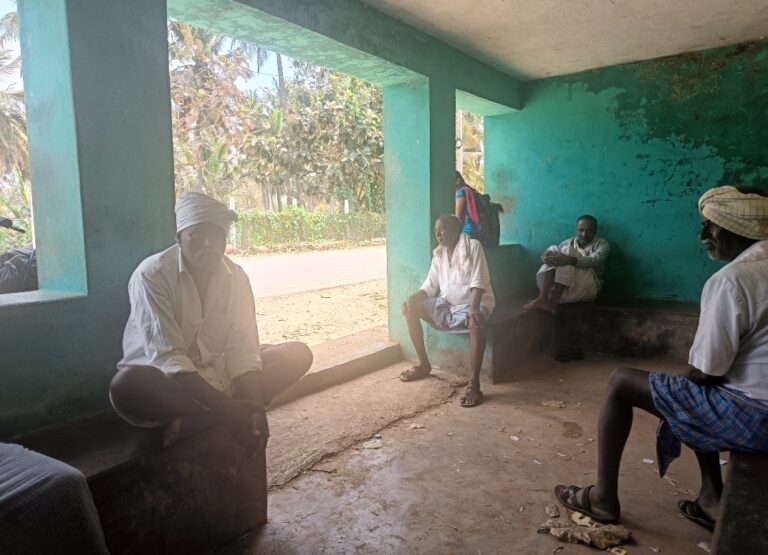
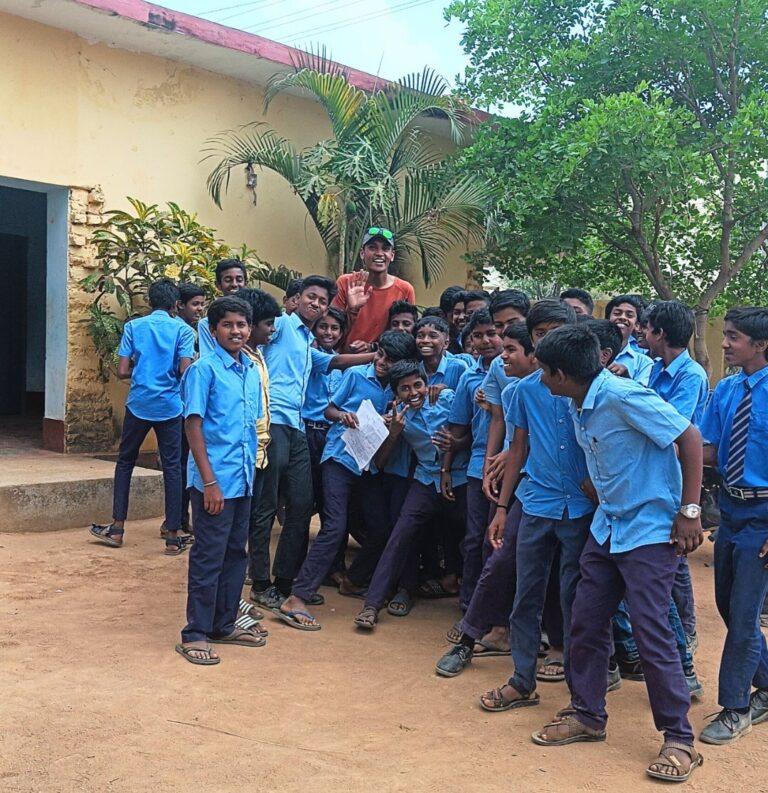
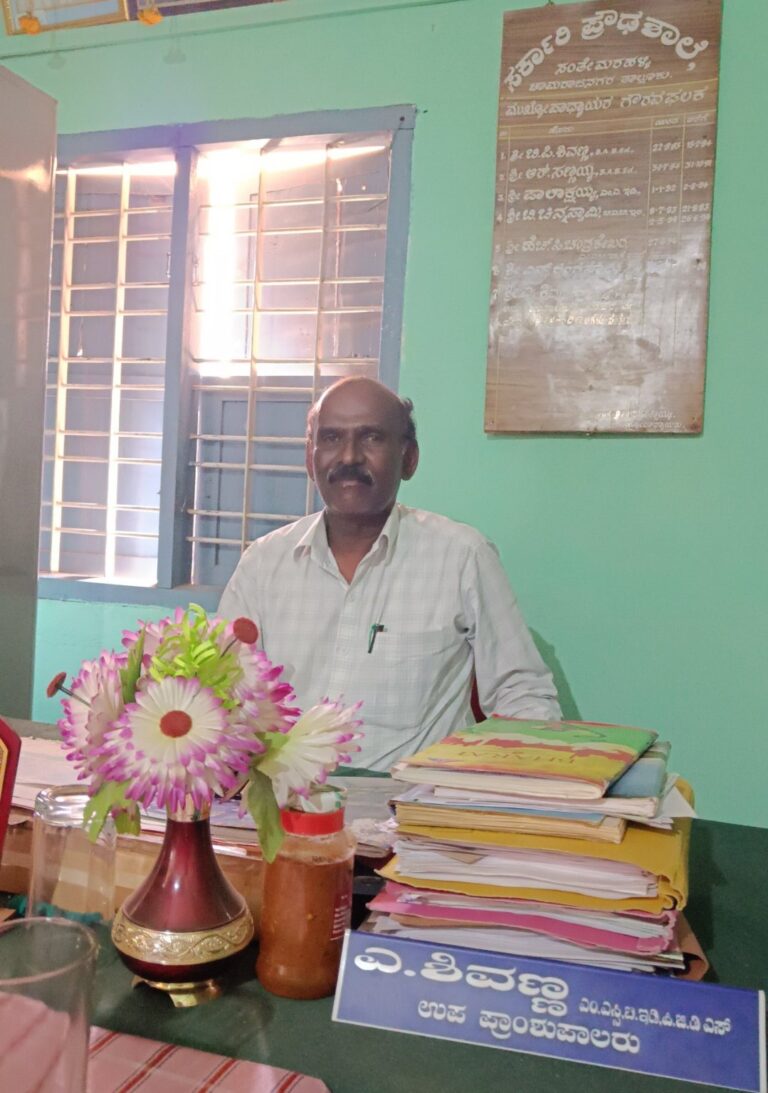
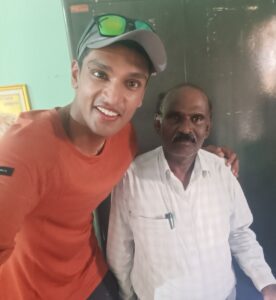
Shivanna sir is truly amazing and inspiring. More strength to him.